The American Civil War, a pivotal moment in the nation's history, was not a sudden eruption but rather a culmination of long-standing tensions that came to a head. While slavery was undeniably at the core of the conflict, the intricate web of political, economic, and social factors that contributed to the outbreak of war is a complex tapestry worth unraveling. Understanding the multifaceted causes behind this defining moment in American history requires a closer examination of the intricate interplay between various factions vying for power and influence.
Key Takeaways
- Slavery's foundational role in sparking the conflict.
- Abolitionist movements challenging the institution.
- Territorial disputes over slavery expansion.
- Debates over states' rights and nationalistic tensions.
Slavery as a Root Cause
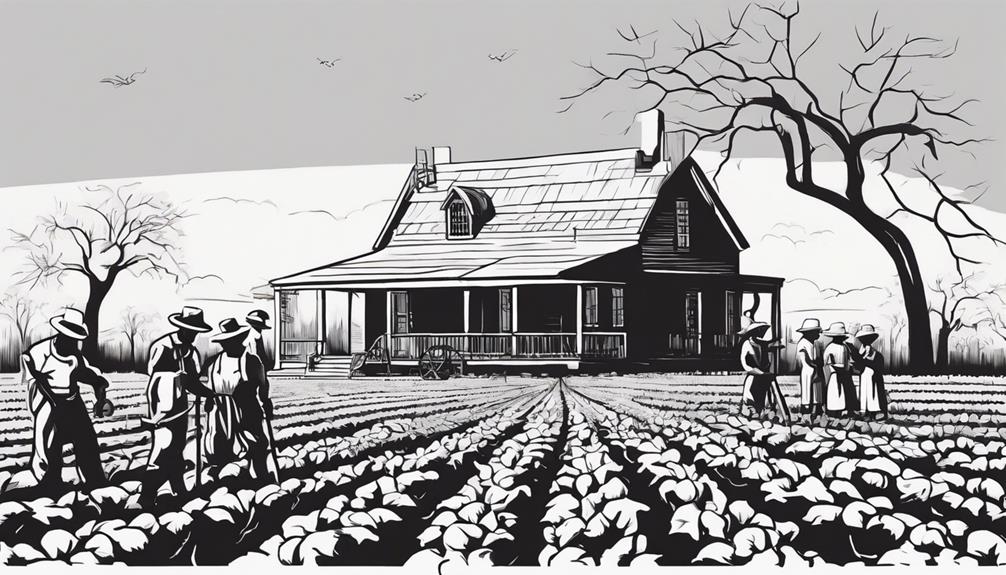
Slavery unequivocally stood as the foundational catalyst for the eruption of the American Civil War, delineating a profound schism within the nation driven by irreconcilable disparities over the institution's presence and expansion. The Southern states heavily relied on enslaved labor for their agrarian economy, contrasting sharply with the industrialized North. The expansion of slavery into new territories further intensified the divide between anti-slavery Northern states and pro-slavery Southern states, fueling animosities. The infamous Dred Scott decision of 1857 exacerbated tensions by denying enslaved individuals citizenship rights and affirming the legality of slavery, deepening the rift between the North and the South. The Southern states' adamant desire to protect and perpetuate the institution of slavery ultimately led to their secession from the Union, setting the stage for the onset of the Civil War. The clash over slavery's presence and expansion was a fundamental issue that underpinned the conflict and irreconcilable differences between the Northern and Southern states.
Abolitionist Movement Influence
The influence of the abolitionist movement on the causes of the American Civil War is a topic of great significance. Understanding the impact of abolitionist ideologies on society, the operational significance of the Underground Railroad, and the influence of anti-slavery activism is crucial to comprehending the complexities that led to the Civil War. By examining these points, we can gain insights into how the abolitionist movement shaped the discourse and actions surrounding the issue of slavery in the United States.
Abolitionist Impact on Society
How did the abolitionist movement in the United States influence societal perceptions and attitudes towards the institution of slavery? The impact of abolitionists on society was profound and played a crucial role in shaping the events leading up to the Civil War. This influence can be observed through:
- Advocacy through Various Means: Abolitionists utilized literature, speeches, and organized societies to promote anti-slavery sentiments.
- Key Figures Leading the Charge: Influential figures like Frederick Douglass, William Lloyd Garrison, and Harriet Beecher Stowe championed the cause of abolitionism.
- Literature's Impact: Works such as 'Uncle Tom's Cabin' by Harriet Beecher Stowe significantly influenced public opinion on slavery.
- Organized Efforts: Abolitionist societies like the American Anti-Slavery Society tirelessly worked to raise awareness about the injustices of slavery, fueling the anti-slavery movement.
Underground Railroad Significance
Demonstrating significant defiance against oppressive laws, the Underground Railroad emerged as a pivotal network aiding enslaved individuals seeking freedom. Abolitionists, including prominent figures like Harriet Tubman, facilitated the operations of this clandestine system by providing critical support and guidance to those escaping slavery. The Underground Railroad's significance extends beyond its immediate goal of helping individuals reach free states and Canada; it also played a crucial role in shaping the anti-slavery sentiment that ultimately fueled the American Civil War. By promoting human rights and actively opposing the institution of slavery, the Underground Railroad contributed to the growing tensions between the North and the South, setting the stage for the conflict that would erupt into the Civil War.
Anti-Slavery Activism Influence
Influential figures within the abolitionist movement, such as Frederick Douglass and Harriet Beecher Stowe, played pivotal roles in advocating for the end of slavery in America. The impact of anti-slavery sentiment was profound, with significant contributions from the American Anti-Slavery Society and other moralistic movements. Key elements that influenced the abolitionist movement and shaped attitudes towards slavery included:
- Literature like 'Uncle Tom's Cabin' by Harriet Beecher Stowe heightened awareness and opposition to slavery.
- Abolitionist societies, such as the American Anti-Slavery Society, actively campaigned for the emancipation of enslaved individuals.
- Moralistic movements based on principles of equality and human rights influenced the growing anti-slavery sentiment in the North.
- The efforts of the abolitionist movement helped mold public opinion and political discourse leading up to the American Civil War.
Territorial Disputes
Territorial disputes leading to the American Civil War were rooted in the contentious issue of expanding slavery into new territories. Conflicting perspectives on the allowance or prohibition of slavery in emerging states fueled tensions between opposing factions. The Kansas-Nebraska Act of 1854 further exacerbated these conflicts by permitting settlers to determine the status of slavery in these territories.
Border Conflicts Intensified
Intensifying border conflicts in the mid-19th century stemmed from disagreements over the status of new territories like Kansas and Nebraska, reflecting the deep-rooted divide between pro-slavery and anti-slavery factions in the United States.
- Border conflicts escalated as new territories grappled with the issue of slavery.
- The Kansas-Nebraska Act of 1854 exacerbated tensions by introducing popular sovereignty.
- Violence erupted in Kansas due to clashes between pro-slavery and anti-slavery groups.
- Territorial disputes highlighted the North-South divide over the expansion of slavery, setting the stage for the broader conflict that would become the American Civil War.
Expansion Fueled Tensions
Amidst the fervent debates over the expansion of slavery into new territories, tensions between the North and South reached a critical juncture, reflecting the deep-seated divisions that would ultimately spark the American Civil War. Southern states pushing for the expansion of slavery clashed with the North's resistance to its spread, leading to heightened sectional animosity. Economic concerns about the implications of slavery in new territories further exacerbated the rift between the regions. The dispute over the status of new states entering the Union added fuel to the fire, as both sides vied for influence over the direction of the nation. This territorial expansion issue played a significant role in escalating tensions and setting the stage for the outbreak of the Civil War.
| Expansion | Slavery |
|---|---|
| New Territories | Sectional Divide |
Disputes Over Territories
The escalating tensions between the North and South due to disputes over territories stemmed from conflicting ideologies regarding the expansion of slavery into new regions, ultimately serving as a significant catalyst for the outbreak of the American Civil War.
- Southern desire to spread slavery to new territories
- Northern commitment to keeping territories open to white labor
- Conflict over the status of new states
- Territorial disputes played a significant role in escalating tensions
The issue of territorial expansion became a major point of contention between the North and South. Disputes over states and territories, particularly the expansion of slavery into new states, intensified the divide between the regions and contributed significantly to the eruption of the Civil War.
States' Rights Debate
The States' Rights Debate during the American Civil War era revolved around the contentious clash between the federal government's authority and the individual autonomy of states. Advocates of states' rights, particularly in the South, contended for the right to nullify federal laws they deemed unconstitutional, while the federal government asserted its supremacy. This ideological battle stemmed from the belief in interposition, which allowed states to intervene against federal overreach on issues such as tariffs, internal improvements, and notably, the expansion of slavery into new territories. The disagreement over the expansion of slavery heightened tensions, contributing significantly to the outbreak of the Civil War.
| Civil War | States Rights | Expansion of Slavery | Federal Government |
|---|---|---|---|
| Tensions rose | Autonomy vs. authority | Key issue | Supremacy emphasized |
| Escalated disputes | Interposition principle | Slavery extension | Nullification attempts |
| Contributed to war | Southern stance | Heightened tensions | Clash over laws |
Sectionalism Dividing the Nation
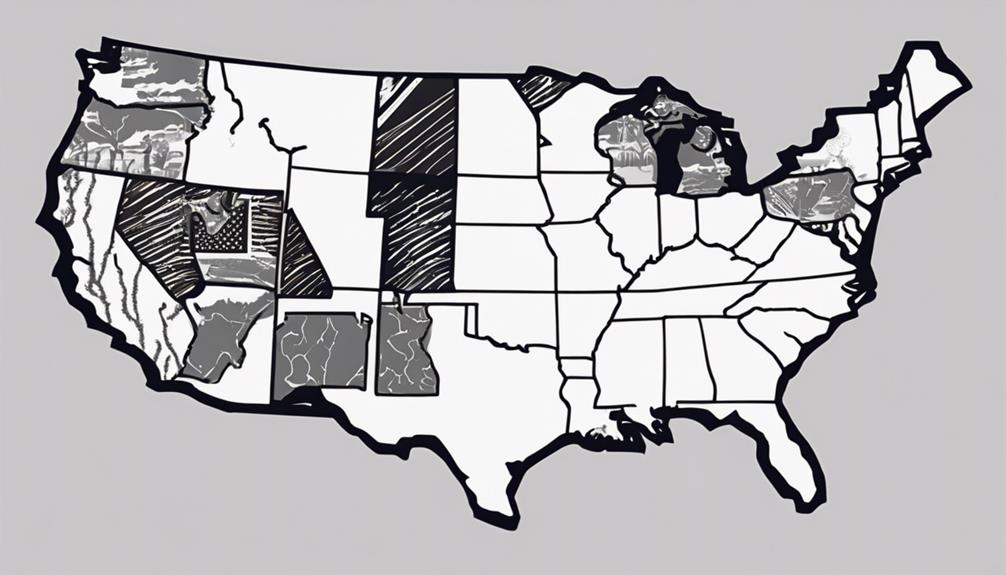
Sectionalism, a significant factor in the lead-up to the American Civil War, exacerbated divisions between the North and South due to contrasting economic, political, and social ideologies. The following factors contributed to the deepening divide:
- Economic Disparities: Varied economic systems in the industrial North and agrarian South created tensions, with each region advocating for its interests.
- Political Differences: Debates over states' rights versus federal authority heightened the sectional conflict, as each side sought to assert its governance principles.
- Social and Cultural Distinctions: The North and South had distinct social structures and ways of life, further alienating one another and fostering animosity.
- Debates Over Slavery Expansion: Disputes over the expansion and abolition of slavery inflamed sectional tensions, ultimately becoming one of the central issues that led to the outbreak of the Civil War.
These factors intertwined to deepen the sectional divide and set the stage for the conflict that would ensue.
Economic Protectionism Impact
The discordance in economic strategies between the North and South, particularly the implementation of protective tariffs in the North, played a pivotal role in escalating tensions that led to the American Civil War. The North's adoption of high tariffs and economic protectionism was designed to shield its industries from foreign competition. However, these policies had adverse effects on the agrarian South, heavily reliant on exporting agricultural goods. The table below illustrates the contrasting economic environments that contributed to the rift between the two regions:
| Aspect | North | South |
|---|---|---|
| Economic Focus | Industrial and manufacturing growth | Agriculture and plantation-based economy |
| Trade Dependency | Diversified economy with less reliance on exports | Heavily dependent on exporting agricultural products |
| Impact of Tariffs | Benefitted from protective tariffs | Suffered from retaliatory tariffs and trade restrictions |
The economic disparities resulting from these contrasting approaches heightened regional tensions, serving as a catalyst for the Civil War. This impact on regional economies underscores the significant role economic protectionism played in the lead-up to the conflict over states' rights and slavery.
Factors of Nationalism and Honor
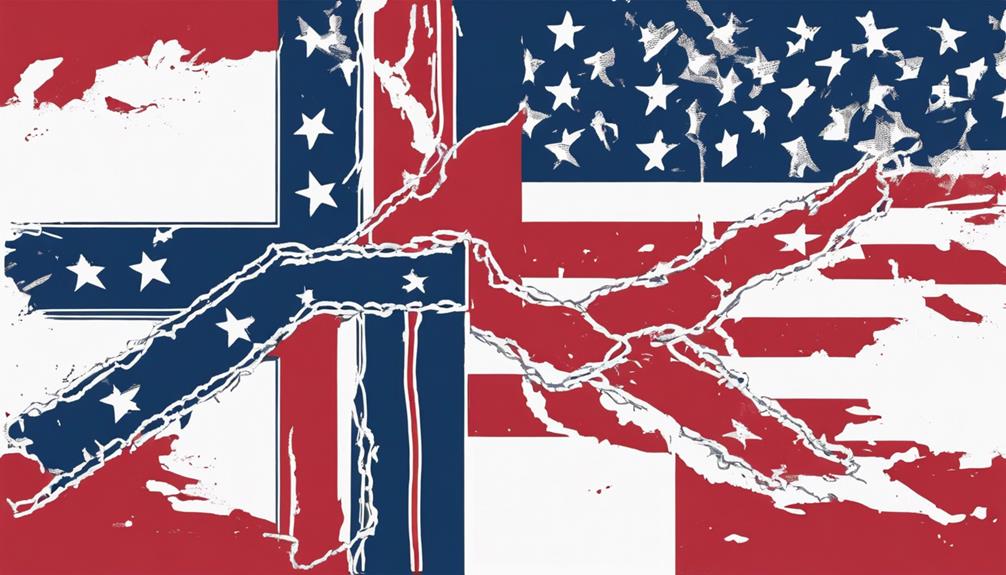
Factors of nationalism and honor played pivotal roles in the lead up to the American Civil War. The strong sense of regional loyalty and pride in defending their way of life, particularly in the South, intensified tensions between the Union and the Confederacy. Concepts of states' rights, honor, duty, and patriotism further fueled the conflict as each side sought to uphold their distinct identities and values.
Nationalism's Role
Nationalistic fervor and a strong sense of honor deeply influenced the dynamics leading up to the American Civil War. The following factors highlight the role of nationalism in the conflict:
- Southern states felt a strong sense of regional identity and loyalty to their way of life.
- Honor and pride were significant factors, with both sides committed to defending their values.
- The concept of states' rights fueled nationalist sentiments, as Southern states believed in their autonomy.
- Nationalism intensified tensions, with each side strongly believing in their cause and cultural preservation. These clashes of nationalistic ideologies heightened the divisions between the Northern and Southern states, ultimately contributing to the outbreak of the Civil War.
Honor and Conflict
In the context of the dynamics leading to the American Civil War, the interplay between honor and conflict, deeply rooted in regional identities and loyalty, emerges as a pivotal factor shaping the course of events. Nationalism, driven by pride in regional identities and loyalty to states, intensified divisions between the North and South. The South's focus on defending its way of life and preserving social and economic structures heightened tensions with the North, which prioritized preserving the Union and federal authority. This clash of nationalistic sentiments also underscored the fundamental disagreement on states' rights. Individual decisions to support secession or remain loyal to the Union during the Civil War were heavily influenced by perceptions of honor, dignity, and self-respect, showcasing the significance of these values in shaping the conflict.
Election of Abraham Lincoln
The election of Abraham Lincoln as the 16th President of the United States in November 1860 marked a pivotal moment in American history, igniting tensions between the North and South over the issue of slavery expansion. This event had significant repercussions due to Lincoln's stance on slavery and political values:
- Lincoln won the presidency without carrying a single Southern state in the election.
- His election on a platform opposing the expansion of slavery into new territories heightened tensions between North and South.
- Southern states viewed Lincoln's election as a threat to their way of life and feared federal interference in their slave-based economy.
- The election of Abraham Lincoln served as a catalyst for several Southern states to secede from the Union and ultimately led to the outbreak of the American Civil War in 1861.
The election of Lincoln exposed the deep-rooted divisions in the nation, particularly regarding the institution of slavery, setting the stage for the conflict that would follow.
Secession Crisis Unfolds
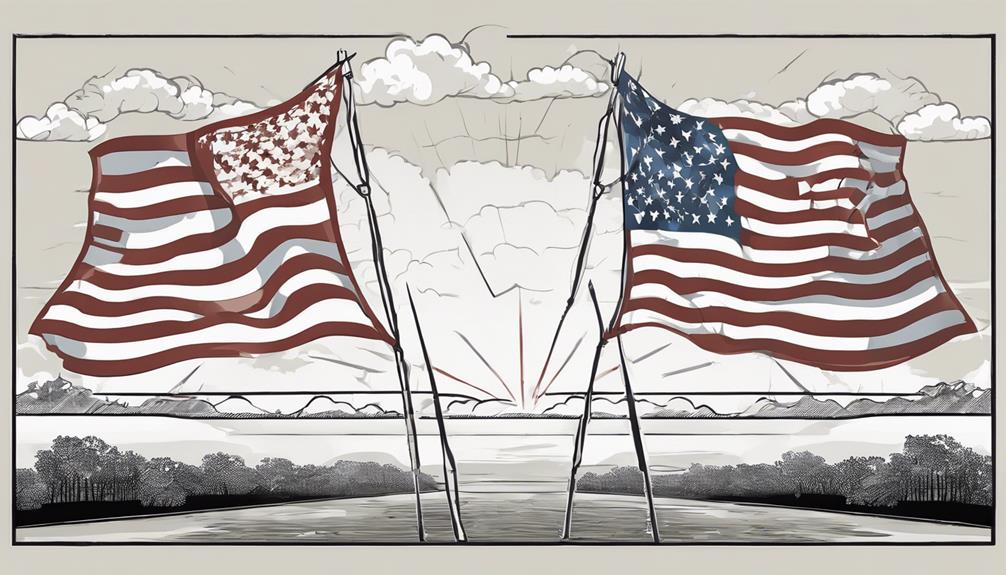
As the Southern states seceded from the Union following Lincoln's election, a series of events unfolded rapidly. States declared their independence, federal forts were seized, and Lincoln's inauguration was threatened. This escalation marked a pivotal moment in American history, setting the stage for the imminent conflict that would become the American Civil War.
States Declare Independence
Amid escalating tensions and political turmoil, Southern states initiated a wave of declarations of independence from the Union, with South Carolina leading the secession movement in December 1860. This marked the beginning of a significant shift towards the inevitable Civil War. Key points during this period include:
- Mississippi, Florida, Alabama, Georgia, Louisiana, and Texas followed South Carolina in seceding.
- Secession conventions were conducted in various Southern states, where overwhelming votes favored leaving the Union.
- By Abraham Lincoln's inauguration in March 1861, seven Southern states had officially seceded.
- The establishment of the Confederate States of America in February 1861, with Jefferson Davis as its president, further solidified the secession crisis.
Federal Forts Seized
Initiating a series of decisive actions, Southern states strategically seized federal forts following their secession from the Union in the early months of 1861. Fort Sumter, located in South Carolina, became the focal point as Confederate forces took control of it in April 1861. This event marked a significant escalation in the secession crisis, with other Southern states quickly following suit in seizing federal forts. The actions of seizing these forts symbolized the deepening divide and mounting tensions between the North and South. Ultimately, the seizure of federal forts played a pivotal role in pushing the nation closer to the brink of the American Civil War, as it demonstrated the resolve of the seceding states and their readiness to challenge federal authority.
Lincoln's Inauguration Threatened
The unfolding secession crisis during Lincoln's inauguration marked a pivotal moment in American history as Southern states continued to break away from the Union. This event set the stage for the American Civil War, with tensions escalating rapidly. Key points during this period include:
- Lincoln's anti-slavery stance led Southern states to secede.
- South Carolina was the first to secede on December 20, 1860.
- By March 4, 1861, seven Southern states had seceded, forming the Confederate States of America.
- Despite Lincoln's attempts to reassure the South in his inaugural address, further secession followed, deepening the crisis and ultimately leading to the outbreak of the Civil War.
Battle of Fort Sumter Ignites Conflict
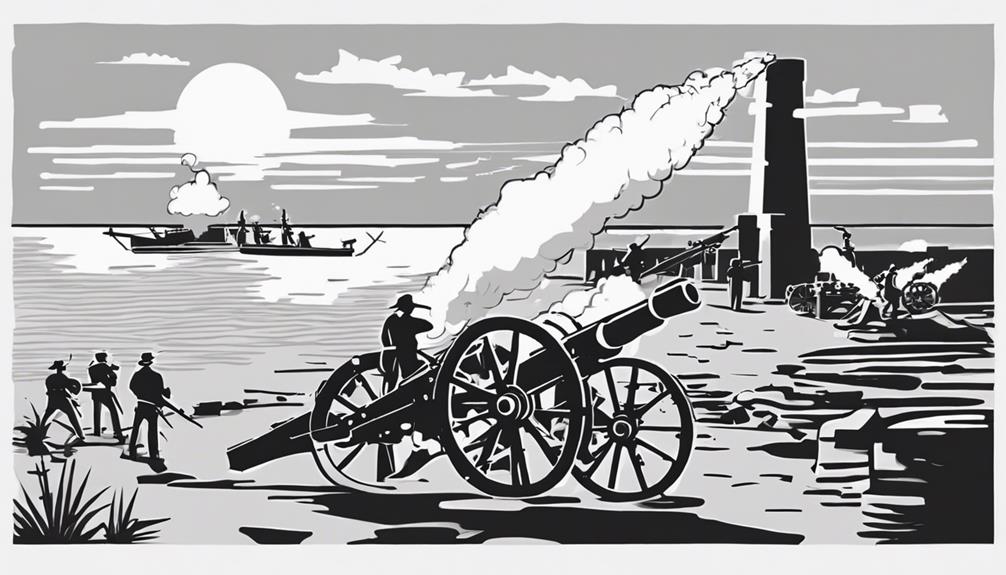
At the onset of the American Civil War, the Battle of Fort Sumter in April 1861 marked a pivotal moment that ignited the conflict between the Union and the Confederacy. Confederate forces, led by General P.G.T. Beauregard, initiated the hostilities by bombarding Fort Sumter in Charleston Harbor, South Carolina. Major Robert Anderson commanded the Union garrison at the fort and ultimately surrendered after enduring a 34-hour bombardment. While the battle resulted in no casualties, it symbolized the beginning of a prolonged and devastating war that tore the nation apart.
The fall of Fort Sumter to the Confederates had significant repercussions. It galvanized both the North and the South, leading to further secession and military mobilization on both sides. The surrender of Fort Sumter fueled the already escalating tensions between the Union and the Confederacy, setting the stage for a brutal conflict that would shape the course of American history.
Border States' Loyalties Tested
Border states such as Kentucky, Maryland, Delaware, and Missouri underwent significant challenges during the Civil War as their loyalties were put to the test due to their strategic location and divided allegiances.
- The border states had substantial slave populations but opted to remain in the Union, causing internal conflicts and challenges.
- Kentucky, with a pro-Confederate government in exile, witnessed military actions and political unrest throughout the war.
- Maryland faced intense pressure from both Union and Confederate forces, resulting in the suspension of civil liberties and the imposition of martial law.
- The decisions of the border states to stay with the Union, despite their slaveholding traditions, played a pivotal role in shaping the Civil War's trajectory and eventual outcomes. The loyalty demonstrated by these states to the Union, despite the presence of slavery, further highlighted the complexity and significance of the factors at play during this tumultuous period in American history.
Mobilization Efforts Begin
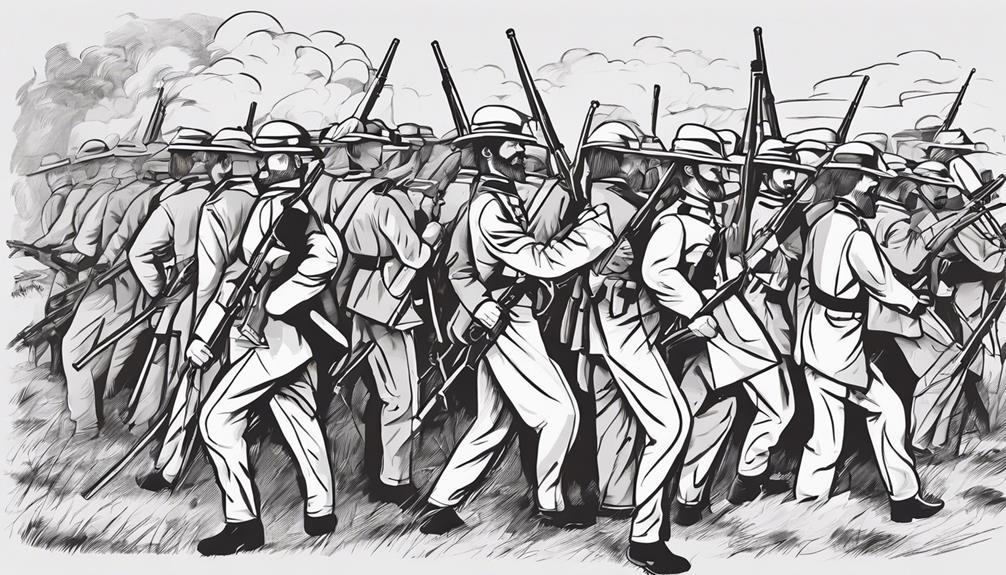
Commencing military mobilization efforts in response to the Confederate attack on Fort Sumter in April 1861, both Northern and Southern states rapidly escalated their preparations for the impending conflict. President Lincoln's call for 75,000 volunteers to suppress the rebellion marked the beginning of significant military mobilization efforts by the Union. Simultaneously, Southern states, having declared their independence, swiftly organized their own military forces and militias to defend against Union forces. As the Civil War intensified, both the Union and the Confederacy implemented conscription policies to strengthen their armies. This period saw a rapid buildup of military forces on both sides, laying the groundwork for large-scale engagements that would define the course of the war. The mobilization efforts undertaken by both the Union and the Confederacy underscored the seriousness with which each side approached the conflict, highlighting the escalating tensions and the commitment to their respective causes.
Role of Women in the War
The significant contributions of women during the Civil War, in roles ranging from nursing and espionage to managing households and fundraising, played a crucial part in shaping the course of the conflict and expanding opportunities for women in society. Women on both sides of the Civil War took on diverse roles that were instrumental to the war effort. Some disguised themselves as men to fight in the military, challenging traditional gender norms of the era. Many women managed farms, businesses, and households when male family members were at war, showcasing their resilience and adaptability. Additionally, women organized relief efforts, fundraising events, and sanitary fairs to provide crucial aid to soldiers and support the war cause. These actions not only influenced the outcome of the Civil War but also paved the way for advancements in women's rights and their broader participation in society.
Naval Tactics and Union Blockade
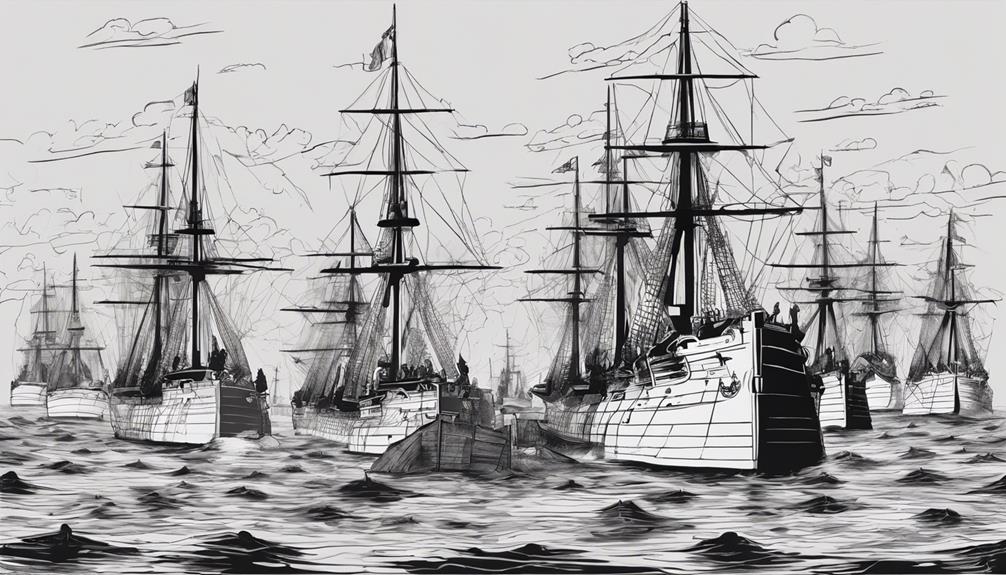
Implementing a strategic blockade, the Union Navy played a pivotal role in disrupting Confederate ports and economy during the American Civil War. By utilizing a blockade strategy, the Union Navy aimed to cut off essential supplies to the Confederacy, limiting their ability to sustain their war efforts. One of the significant naval tactics employed was the use of ironclad warships such as the USS Monitor and the CSS Virginia (formerly USS Merrimack) in key battles. These ironclad warships revolutionized naval warfare during the Civil War, showcasing their effectiveness in combat situations.
The Union blockade severely restricted Confederate trade, hindering their economy and overall war capabilities. Despite Confederate attempts to break the blockade, like the famous Battle of Mobile Bay, the Union Navy maintained its dominance, ensuring the blockade's effectiveness. Ultimately, the naval engagements and the Union blockade played a crucial role in weakening the Confederate forces and contributing significantly to the eventual Union victory in the Civil War.
Diplomatic Relations During the Conflict
Throughout the American Civil War, diplomatic relations played a critical role in shaping international perceptions and influencing the strategies of both the Union and the Confederacy.
- The Confederacy sought diplomatic recognition from European powers such as Britain and France.
- Confederate diplomats, including James Mason and John Slidell, were involved in high-profile incidents like the Trent Affair in 1861.
- The Union focused on preventing European recognition of the Confederacy and maintaining a blockade of Southern ports.
- Despite economic interests in Southern cotton, European powers chose to remain neutral and did not officially recognize the Confederacy.
These diplomatic tensions underscored the complexities of international relations during the Civil War and highlighted the significant impact foreign involvement could have on the conflict's outcome. The failure of the Confederacy to gain formal recognition from European powers limited its ability to secure vital support and resources, ultimately affecting its war efforts and eventual defeat.
Frequently Asked Questions
What Are the 3 Main Causes of a Civil War?
State rights, economic differences, and political tensions are among the primary causes of civil wars. State rights often lead to conflicts over power distribution within a nation, while economic disparities can create inequalities that spark unrest. Political tensions arise from disagreements over governance and policy decisions, further exacerbating divisions. These factors, combined with social divisions and grievances, can culminate in civil conflicts that threaten the stability and unity of a society.
What Started the American Civil War?
Economic tensions, political disagreements, states' rights, and the clash between sectionalism and nationalism ignited the American Civil War. These deep-rooted issues, fueled by diverging ideologies and interests, culminated in a devastating conflict that divided a nation. The spark that set off this powder keg was the Confederate forces firing upon Fort Sumter in 1861, marking the beginning of a bloody struggle that would shape the course of American history.
Was Slavery the Reason for the Civil War?
Slavery was indeed a pivotal factor in the eruption of the American Civil War. Economic factors, political tensions, states' rights, and sectionalism all converged around the institution of slavery, leading to heightened social divisions and cultural differences. Territorial disputes and power struggles further exacerbated the situation. The question of whether slavery was the reason for the Civil War is complex, as it intertwined with various other contentious issues, ultimately culminating in the conflict.
Was the Civil War Not About Slavery?
While various factors like States' rights, economic considerations, political tensions, and regional disparities contributed to the American Civil War, the fundamental question of whether the conflict was not about slavery remains contentious. Analyzing these elements individually reveals complexities that underscore the multifaceted nature of the war's origins. Understanding the intricate interplay of these factors is essential in comprehending the broader context of the Civil War beyond a singular focus on slavery.
Conclusion
In conclusion, the American Civil War was primarily caused by the deep-rooted conflict over slavery's economics and political control in the United States. The election of Abraham Lincoln in 1860 heightened tensions, leading to Southern states feeling excluded and ultimately seceding. The inability to reconcile fundamental differences over slavery, territorial expansion, and states' rights resulted in the outbreak of the Civil War in 1861. How could a nation so divided find a path towards unity and peace?
